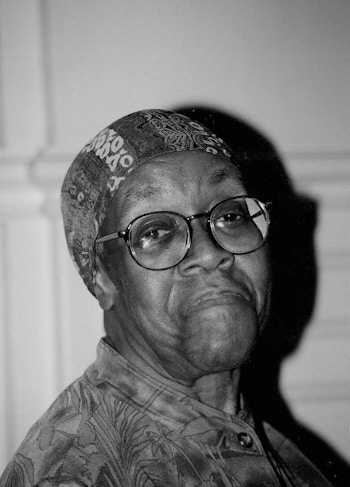
Gwendolyn Brooks was born in Topeka, Kansas, and raised in Chicago. Her well-educated parents encouraged her passion for reading and writing, and she published her first poem in American Childhood at 13. By her late teens, she was publishing consistently in the poetry column at the famed Black newspaper Chicago Defender and corresponding with poetic luminaries like James Weldon Johnson and Langston Hughes about her writing. She attended Woodrow Wilson Junior College and worked as a typist, then held a role at the National Association for the Advancement of Colored People before turning her attention entirely back to poetry. She began attending poetry workshops and wrote the poems based on inner-city Black lived experience that would become her first collection, 1945’s A Street in Bronzeville.
Over her long career, Brooks wrote more than 20 books of poetry, including Annie Allen (1949), which earned her the first Pulitzer Prize won by a Black person. She also wrote a novel, Maud Martha, and books for children. A member of the Black Power movement, Brooks wrote on political and cultural themes including the civil rights movement in a wide range of forms. Although she was represented early on by commercial publisher Harper & Row, she opted to publish instead with independent Black presses like Broadside Press and Third World Press to support their work.
The Poet Laureate of Illinois from 1968 until her death, Brooks’ many honors include being named the first Black female consultant to the Library of Congress and the first Black member of the National Institute of Arts and Letters, major awards including an American Academy of Arts and Letters Award, the National Medal of the Arts, the Frost Medal, a National Endowment for the Arts Award, Academy of American Poets and Guggenheim Foundation fellowships, and over 50 honorary degrees.
Brooks, who raised two children with her husband, Henry Lowington Blakely, Jr., also taught at colleges around the central and eastern U.S. In her later years, she spread the message of poetry by organizing readings at prisons and hospitals and poetry contests for the young. Her legacy includes schools and parks renamed in her honor, a U.S. postage stamp with her likeness, and a powerful influence on generations of American poets.
-
Photo copyright John Mathew Smith 2001 via Kingkongphoto & www.celebrity-photos.com, shared under CC BY-SA 2.0, converted to black and white.